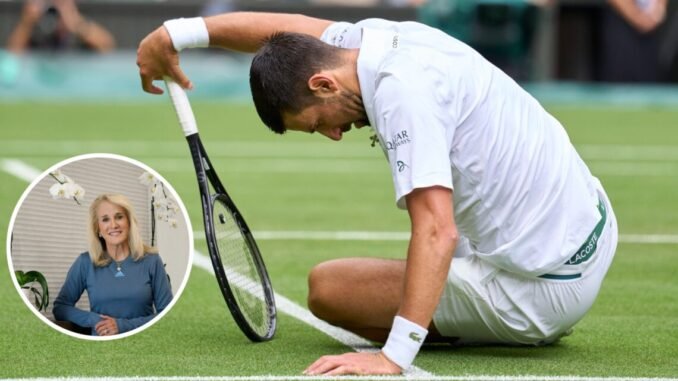
Tracy Austin Weighs In: Would Novak Djokovic Ever Come Clean About a Wimbledon Injury?…Read More…
In the high-stakes world of professional tennis, where grit and gamesmanship often collide, transparency around player injuries remains a murky subject. This week, two-time Grand Slam champion and respected tennis analyst Tracy Austin stirred the conversation when asked a pointed question: Would Novak Djokovic ever truly admit to being injured at Wimbledon?
Her response, both candid and thought-provoking, has since rippled through the tennis community — igniting debate on the pressures elite athletes face when balancing honesty, vulnerability, and strategic silence.
The Djokovic Enigma
Novak Djokovic, a seven-time Wimbledon champion and one of the most decorated players in tennis history, has always been a polarizing figure — admired for his brilliance, yet often scrutinized for his perceived theatrics, especially when it comes to injury concerns.
Fans and commentators alike have noted how Djokovic sometimes appears physically compromised, only to produce jaw-dropping performances moments later. While some argue this speaks to his mental resilience and body awareness, others accuse him of exaggerating or even using the appearance of injury as a tactical tool to throw off opponents.
It was against this backdrop that Tracy Austin was asked during a recent broadcast interview whether she believed Djokovic would openly admit to an injury, especially during a Grand Slam as monumental as Wimbledon.
Austin’s Thoughtful Take
Austin, who won the US Open in 1979 and 1981 and now serves as a respected voice for tennis commentary, didn’t shy away from the complexity of the question.
“Look, Novak is one of the most intelligent and mentally tough competitors the sport has ever seen,” Austin began. “But part of that toughness means controlling the narrative around him — and injuries, especially at Wimbledon, are part of that narrative.”
She went on to say that while Djokovic has indeed played through serious injuries — including torn muscles and chronic elbow issues — he has historically kept those matters guarded, especially during major tournaments.
“I don’t think he’d be quick to fully disclose anything mid-tournament,” Austin said. “It’s not about deception. It’s about not giving your opponents a psychological edge. If you admit to being hurt at Wimbledon, on grass, where margins are so tight, you risk letting that vulnerability work against you.”
A History of Mixed Signals
Austin’s remarks shine a light on a recurring pattern in Djokovic’s career: the ongoing question of when — and how much — he chooses to reveal about his physical state.
One prominent example came during the 2021 Australian Open. Djokovic sustained what was later confirmed to be a torn abdominal muscle, yet managed to win the tournament, defeating the likes of Milos Raonic and Daniil Medvedev along the way. At the time, many were skeptical of the severity of his injury — until MRI scans validated his claims after the fact.
Similarly, during Wimbledon 2023, Djokovic appeared to struggle with a hamstring issue during early rounds, only to dominate top-tier opponents later in the draw. He later alluded to discomfort but kept details vague until the tournament was over.
“He’s not lying,” Austin clarified in her interview. “But he’s calculated. And I think that’s what separates the greats — they know how to use every piece of the puzzle, including public perception.”
Fans and Fellow Players React
The tennis world, ever-passionate and divided, reacted swiftly to Austin’s comments. Social media platforms lit up with praise for her honesty, with some fans agreeing that Djokovic’s selective transparency is simply smart strategy.
Others, however, criticized the implication that Djokovic manipulates injury narratives, with many pointing out that the Serbian star has endured more scrutiny than his peers when discussing injuries.
Former player and coach Darren Cahill tweeted:
“Novak has earned the right to protect his body and his process. People don’t fake playing with pain — they manage it. Big difference.”
On Reddit, one fan commented:
“If Rafa tapes his foot or Roger mentions his knee, it’s seen as heroic. If Novak says his back hurts, people think it’s drama. Double standards, anyone?”
The Pressure to Stay Silent
Austin also touched on a larger theme: the immense pressure top athletes face to appear invincible. In an era of 24/7 coverage, where every limp and wince is analyzed in slow motion, players often choose silence over scrutiny.
“At Wimbledon especially, everything is magnified,” Austin said. “Novak knows that. He’s one of the most studied athletes on the planet. He’s aware that even acknowledging a mild strain could be turned into a headline.”
Indeed, Wimbledon — with its pristine courts, strict dress code, and global spotlight — is as much about tradition and perception as it is about competition. And for a champion like Djokovic, maintaining an aura of control is often just as crucial as his backhand return.
Looking Ahead
As Djokovic continues his campaign at Wimbledon 2025, his physical form — and how much of it he chooses to share — remains under the microscope. Following a grueling match earlier this week where he was seen clutching his elbow and noticeably reducing the velocity on his serve, speculation has swirled once again.
Will he address it? Will he deny it? Or will he, as Austin suggests, stay mum until the final ball is struck?
“I think we’ll know the truth only after the tournament ends,” Austin concluded. “That’s how Novak operates. And frankly, I don’t blame him.”
Whether fans see it as guarded brilliance or veiled gamesmanship, one thing is clear: in Novak Djokovic’s world, strategy doesn’t stop at the baseline — it extends all the way to the press room. And Tracy Austin’s candid insight has only made that truth more undeniable.
Leave a Reply